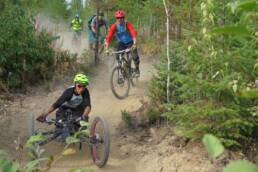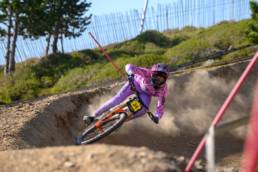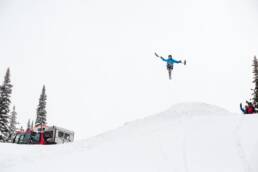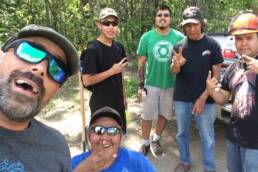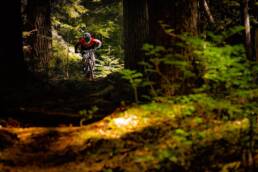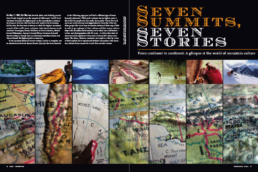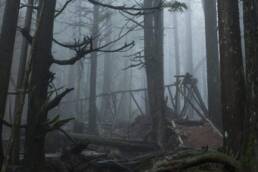Spurred by a spirit of inclusion for their fellow riders, three Kootenay communities dig wide and deep for bikers downed but not out. By Matt Coté.
Correction: Daniel Scott, trails specialist with the BC government, touched base to let us know that, in fact, the world’s first adaptive mountain bike trail was built in North Carolina and is called Jetton Park’s Trail Loop. And Canada’s first purpose-built aMTB trail is in the Wascana Recreation Site just outside of Regina. The trails in the West Kootenay communities mentioned in this story are a first for British Columbia and are now the leading destination for Canada with hopes of setting precedent provincially, nationally and internationally.
Bending gently through a forest of juvenile spruce in an old cut block, a new throughway of Kootenay “brown pow” is gaining notoriety as a first of its kind. Above Slocan Lake, the bold stripe of downhill dirt weaves through electric green subalpine scrub with proud conspicuousness. The Spine Trail, as its dubbed, is the world’s first purpose-built adaptive mountain-bike (aMTB) trail.
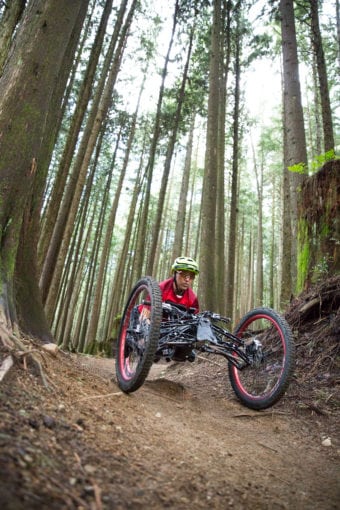
The 2.7-kilometre shuttle-accessed extension of New Denver’s beloved Butter trail is, in fact, part of a trio of new adaptive trails freshly open as of spring 2018. All three are designed specifically for disabled riders on adapted mountain bikes (hand-pedalled trikes), dotting a 150-kilometre corridor from New Denver to Nakusp to Revelstoke, British Columbia. The three communities have together become the first free aMTB destination on earth, with hopes of servicing leagues of newcomers.
Statistics Canada reports that 86,000 Canadians currently live with spinal-cord injuries, and there are 4,300 new cases each year. “Adaptive mountain biking is where sit-skiing was 10 years ago,” says Tara Llanes, a former champion BMX and mountain-bike racer who lost the use of her legs in a 2007 crash. “I haven’t seen anywhere else with trails built to be sure that adaptive riders with adaptive bikes could ride from top to bottom. We’re so right at the beginning of this whole thing.” Originally from California, Llanes now lives in North Vancouver, British Columbia, and, along with Mark Wood, recently penned a set of guidelines for aMTB trailbuilding from their experience retrofitting North Vancouver’s famed Bob Sled trail. “That’s definitely more of an advanced trail,” Llanes says, explaining that building from scratch is the better way to tailor something for everybody.
“The Kootenays are so inclusive!” exclaims Janis Neufeld of the Nakusp and Area Bike Society and project manager of the Mount Abriel development, a local initiative that’s currently building 50 kilometres of new trail for all levels, as well as a portion for adaptive riders. Neufeld happens to also be an old friend of Llanes’s wife, mountain-bike pioneer Elladee Brown. Brown, who grew up in Nakusp, introduced Llanes to New Denver’s Mark Koolen of the North Slocan Trail Society, after he first tabled the idea of adaptive trails in the area, and Koolen then hired Llanes as a consultant. Serendipitously, the Revelstoke Cycling Association (RCA) began work on a new beginner trail around the same time. When it found out what was happening 100 kilometres south, the RCA also reached out to Llanes to see how much more work it would take to make an aMTB trail, and then went for it.
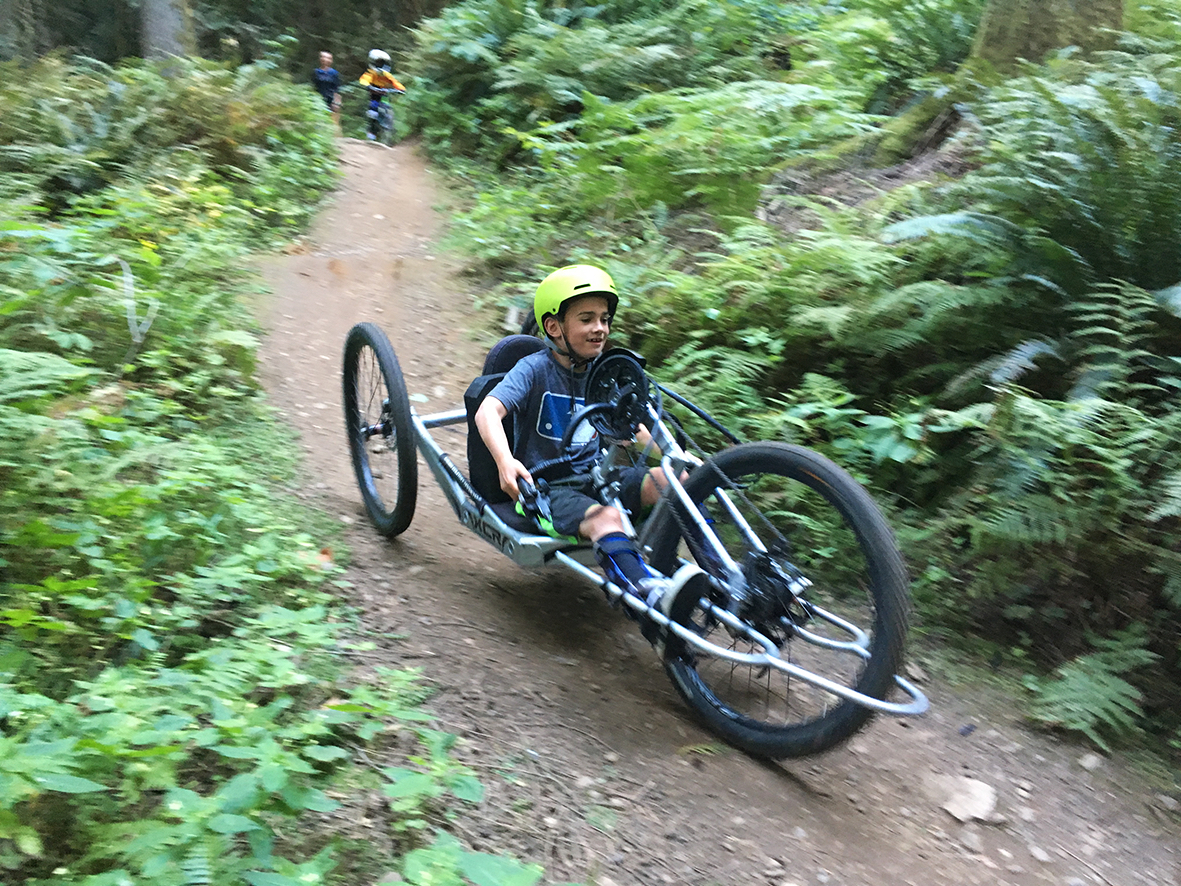
Miller Time, as the Revelstoke trail is now called, is named for local disabled rider Chris Miller. It’s a 1.1-kilometre cross-country loop that departs from the MacPherson area’s Griffith parking lot that has five pullouts for passing. Nakusp’s as-of-yet unnamed trail will also carry an aMTB beginner (green) rating, but after its initial 2.6 kilometres of lakeside cross-country is complete, it will eventually patch into an aMTB intermediate (blue) section and then an aMTB advanced (black) section—all linked to an easy-to-access campground.
The three trails now adhere to Llanes and Wood’s aMTB Guidelines, which were adopted by the International Mountain Bicycling Association. In general, they state that “treads must be wider, uphill gradient decreased and less abrupt, downhill gradient decreased and less abrupt, turning radius increased, bridges widened and access to the trails needs to accommodate aMTB including low-grade climbs.” They also require passing pullouts at various intervals.
“I haven’t seen anywhere else with trails built to be sure that adaptive riders with adaptive bikes could ride from top to bottom. We’re so right at the beginning of this whole thing.” – Tara Llanes, former champion mountain-bike racer.
“Everybody knows somebody in a chair,” Llanes says, noting that since she started selling adaptive bikes online in 2013 and hosting camps two years ago she’s seen a steady rise in interest. The Whistler Adaptive Sports Program, for example, bought three bikes last year that have been rented flat out ever since. Part of the difficulty with the sport is the bikes cost around $10,000. “People straight out of rehab, they have to purchase a new bike, a new basketball chair, a new tennis chair,” explains Llanes, “and they each cost minimum six or seven grand.”
It’s why the three key Kootenay cycling clubs, along with the Kootenay SufferFest, have a vision of forming an association to make sure both trails and bikes are accessible when people come to visit. “The road trip is such an awesome thing to do in BC,” says Koolen, “and an adaptive road trip would be so awesome.”
Llanes agrees. “Riding the Spine Trail is a breathtaking experience. You’re way up in the alpine and surrounded by unreal views of the Kootenays, and back on dirt!” she says, adding, “The way to build this is through community.”
Matt Coté
Matt is the associate editor at Forecast. He's been penning and editing ski, adventure and mountain culture-based stories for over a dozen publications for the last decade.
Related Stories
The DH Mountain Bike World Cup As Seen Through The Lens Of A Kootenay Photographer
Canadians dominated the junior ranks at the DH Mountain Bike World Cup in Andorra this July. Kootenay photographer…
Behold: The World’s First Big Mountain Adaptive Ski Comp
Returning to the scene of a crash that cost him dearly, a former snowboarder-turned-sit skier is nevertheless living…
How Mountain Bike Trails Are Changing The First Nations Experience
Patrick Lucas, the founder of British Columbia's Aboriginal Youth Mountain Bike Program, was recently in northern…
Whistler Mountain Bike Park to Expand Creekside Zone
Whistler Mountain Bike Park has just confirmed it will be adding 15 kilometres of new trail to its Creekside Zone by…
An Ode To Mountain Bike Stunts
Back in the era of teeters, skinnies and rickety ramps galore, mountain-bike stunts defined the sport's bombast and…


